CE |
Day |
Event |
Vikram
Samvat |
Month |
Tithi |
| |
|
||
1 January || |
|
|
|
| 1820 |
Saturday |
Vachanamrut Gadhada
I-30
Shriji Maharaj states, “If someone sincerely practises satsang
and reflects upon and tries to imbibe the discourses relating to
God, then his vile thoughts are eradicated. In this manner, the
influence of satsang is extremely powerful. In fact, no other spiritual
endeavour can compare with satsang.”
|
1876 |
Posh |
vad 1 |
| 1965 |
Friday |
Murti-pratishtha at Chogath
|
2021 |
Magshar |
vad 14 |
1972
|
Saturday |
Murti-pratishtha at Chuda |
2028 |
Posh |
vad 1 |
| 1974 |
Tuesday |
Murti-pratishtha at Gariya |
2030 |
Posh |
sud 8 |
| 1978 |
Sunday |
Murti-pratishtha at Untvala |
2034 |
Maha |
vad 7 |
| 1981 |
Thursday |
Murti-pratishtha at Ningala (Women's
Mandir) |
2037 |
Magshar |
vad 11 |
| 1984 |
Sunday |
Murti-pratishtha at Chansad |
2040 |
Magshar |
vad 13 |
| 1991 |
Tuesday |
Murti-pratishtha at Nalvali sheri |
2047 |
Posh |
vad 1 |
| 1996 |
Monday |
Murti-pratishtha at Navsari |
2052 |
Posh |
sud 11 |
| 2000 |
Saturday |
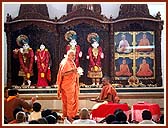 Murti-pratishtha
at Chennai Murti-pratishtha
at Chennai |
2056 |
Magshar |
vad 10 |
| 2002 |
Tuesday |
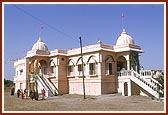 Murti-pratishtha
at Mohadi Murti-pratishtha
at Mohadi |
2058 |
Magshar |
vad 2 |
| |
|
|
|
|
|
| |
|
||
2 January || |
|
|
|
| 1820 |
Sunday |
Vachanamrut Gadhada
I-31
Describing what makes a person great, Shriji Maharaj says, “Greatness
is due to one’s faith in the manifest form of God and the
observance of His commands. However great a person may be in worldly
matters, if he lacks these two attributes then he is still ordinary.”
|
1876 |
Posh |
vad 2 |
| 1821 |
Tuesday |
Vachanamrut Loya-15
Shriji Maharaj concisely explains the Vedant philosophy, “Vedanta,
that is, the Upanishads, expound only Purushottam Narayan Brahma,
the ultimate cause of all, as being satya, and claim all else to
be false. Just as when one attains the viewpoint of akash one does
not perceive the other elements, in the same way, one who sees only
Brahma, perceives nothing else. That is the philosophy of Vedanta.”
|
1877 |
Mãgshar |
vad 13 |
| 2002 |
Wednesday |
Murti-pratishtha at Lotarava |
2058 |
Mãgshar |
vad 3 |
| 2002 |
Wednesday |
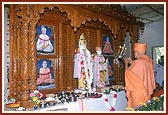 Murti-pratishtha
at Galvade Murti-pratishtha
at Galvade |
2058 |
Mãgshar |
vad 3 |
| |
|
|
|
|
|
| |
|
||
3 January || |
|
|
|
| 1820 |
Monday |
Vachanamrut Gadhada I-32
Teaching how to behold the murti of God in one’s heart, Shriji
Maharaj explains, “Different gunas enter the antahkaran at different
times. When sattvagun prevails, the antahkaran is pure, and one can
pleasantly engage in worship and remembrance of God’s form.
When rajogun prevails, the antahkaran becomes polluted and many disturbing
thoughts arise, making it difficult to engage in worship and remembrance.
When tamogun prevails, no thoughts arise in the antahkaran at all.
Therefore, a person engaged in worship should learn to recognise the
prevailing guna and should meditate on the form of God whenever sattvagun
prevails.” |
1876 |
Posh |
vad 3 |
| 1821 |
Wednesday |
Vachanamrut Loya-16
Shriji Maharaj reveals the qualities of one who has overcome all material
desires, “If a person has perfectly imbibed the following four
qualities, then his worldly desires would become uprooted: gnan in
the form of knowledge of the atma, vairagya in the form of detachment
from all things that have evolved out of Prakruti, dharma in the form
of brahmacharya, etc., and bhakti coupled with the knowledge of God’s
greatness. Any deficiency in these four qualities leads to a proportional
deficiency in uprooting one’s worldly desires.”
|
1877 |
Mãgshar |
vad 14 |
| 1982 |
Sunday |
Murti-pratishtha at Selvas |
2038 |
Posh |
sud 3 |
| 1999 |
Sunday |
Murti-pratishtha at Dhankaniya |
2055 |
Posh |
vad 1 |
| 2000 |
Monday |
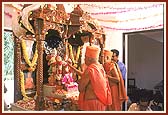 Murti-pratishtha
at Pondichery Murti-pratishtha
at Pondichery |
2056 |
Mãgshar |
vad 12 |
| 2002 |
Thursday |
Murti-pratishtha
at Kusumba |
2058 |
Mãgshar |
vad 5 |
| |
|
|
|
|
|
| |
|
||
4 January || |
|
|
|
| 1758 |
Saturday |
Birth of Muktanand Swami at Amreli
|
1814 |
Posh |
vad 11 |
| 1821 |
Thursday |
Vachanamrut Loya-17
Shriji Maharaj describes the qualities of one whose mind remains
pure, “If a person is indifferent to his body, has firmly
realised his self to be the atma, maintains vairagya towards the
panchvishays and has absolute faith in God coupled with the knowledge
of His greatness, then his mind will never become perverted –
even amidst the most adverse circumstances imaginable.”
|
1877 |
Mãgshar |
vad 30 |
| 1826 |
Wednesday |
Vachanamrut Vartal-6
Shriji Maharaj talks about the effect on society when people offer
sincere devotion to God, “When many people become ekantik
bhaktas of God, then Satya-yug prevails even in Kali-yug.”
|
1882 |
Mãgshar |
vad 11 |
| 1997 |
Saturday |
Murti-pratishtha at Buhari |
2053 |
Mãgshar |
vad 10 |
| |
|
|
|
|
|
| |
|
||
5 January || |
|
|
|
| 1821 |
Wednesday |
Vachanamrut Gadhada
I-33
Shriji Maharaj states, “Accepting the firm refuge of God is
the single, greatest endeavour amongst all spiritual endeavours
for pleasing God. That refuge, though, must be extremely firm and
without any flaws.” |
1876 |
Posh |
vad 5 |
| |
Friday |
Vachanamrut Loya-18
Shriji Maharaj explains the nature of God, that all avatars are
manifestation of one supreme God, “It is that very God who
assumes the forms of Matsya, Kachchha, Varah, etc., and the forms
of Ram, Krishna, etc., for the purpose of fulfilling some task.
He does not, however, abandon His original form to assume the form
of these avatars. That God Himself assumes the forms of Matsya,
Kachchha, etc., possessing countless divine powers and boundless
strength.” |
1877 |
Posh |
sud 1 |
| 1825 |
Monday |
Vachanamrut Gadhada
II-66
Shriji Maharaj describes what happens to a devotee who has attained
the association of the manifest form of God, “While alive,
a person who has attained God and His Sant spends his days and nights
engrossed in spiritual discourses, devotional songs, etc., related
to God. He also has the direct realisation of his jivatma, which
transcends the three states7, as being brahmarup. With the exception
of God, he develops vairagya for all other objects. Also, he discards
adharma and abides by dharma.
“When that devotee dies, God makes him just like Himself.” |
1880 |
Posh |
sud 4 |
| 1827 |
Wednesday |
Vachanamrut Gadhada
II-43
Shriji Maharaj says, “Only one who has love for God having
become gunatit, is brahmaswarup [i.e. brahamrup].” |
1881 |
Posh |
vad 1 |
| |
Friday |
Iccharambhai passes away to Akshardhãm |
1883 |
Posh |
sud 8 |
| |
|
|
|
|
|
| |
|
||
7 January || |
|
|
|
| 1826 |
Saturday
|
Vachanamrut Vartal-7
Explaining how God pervades, yet is separate from and untouched
by the material world, Shriji Maharaj says, “There is akash
in the seed of a tree; and when a tree grows from that seed, akash
will still remain within all of its branches, leaves, flowers and
fruits in an anvay manner. Yet, when the tree is cut, akash is not
cut along with it; and when the tree is burnt, akash is not burnt.
In the same manner, God is anvay within maya and the entities that
have evolved from it; yet, He is also vyatirek from it just like
akash. This is the anvay-vyatirek nature of God’s form.” |
1882 |
Mãgshar |
vad 14 |
| 1829 |
Wednesday |
Vachanamrut Gadhada
III-29
Shriji Maharaj states the understanding devotees should develop
so that duties are sincerely performed, “In our Satsang fellowship,
since all of the males, females and paramhansas are attached to
me, all the other females observe religious vows to the same extent
as the two or three senior women. Why? Because in their mind, they
realise, ‘If we do not remain alert and observe the religious
vows, the love which Maharaj has for us will not remain, and He
will become displeased.’ The paramhansas also behave in the
same manner. In fact, it is the same for all of the other satsangis,
brahmacharis and parshads. All of the male and female devotees living
far and wide are also alert in observing the religious vows; they
too feel, ‘If we do not behave properly, Maharaj will become
displeased.’ Thus, all of them staunchly observe dharma out
of affection for me, even though they may possess vairagya to a
greater or lesser degree.” |
1885 |
Posh |
sud 2 |
| 1996 |
Sunday |
Murti-pratishtha
at Varkhede |
2052 |
Posh |
vad 2 |
| 1996 |
Sunday |
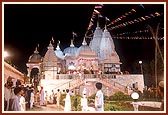 Murti-pratishtha
at Amalner Murti-pratishtha
at Amalner |
2052 |
Posh |
vad 2 |
| |
|
|
|
|
|




